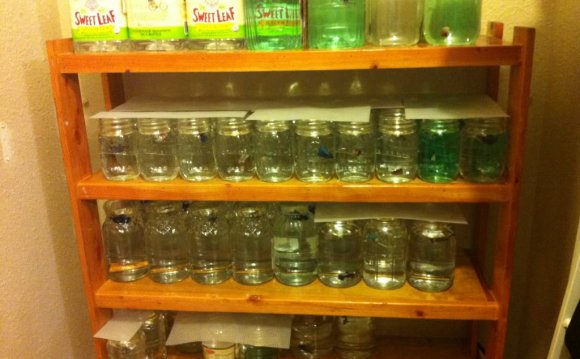
 Fish bowls are too small for bettas.
Fish bowls are too small for bettas.
Betta fish, also known as Siamese fighting fish, are generally low-maintenance pets that can survive in less-than-ideal living conditions. However, in order for your betta to thrive and reach its maximum body size, the water, tank size, food and overall health of your betta come to play. The average growth length for betta fish is 2.25 inches, but manipulating your betta's environment allows your betta to reach its maximum size.
Keep your betta fish in a tank of at least 5 gallons. Pet stores often sell betta fish in small cups or bowls to save space, since bettas cannot be kept together in a single tank due to aggression toward each other.
Replace 50 percent of the water on a daily basis if you want a larger betta. Bettas excrete a hormone that inhibits their growth, so removal of most of this water is essential for maximum growth, according to the Betty Splendens website. Refill the tank with clean treated water.
Maintain a tank temperature of 72 to 80 degrees Fahrenheit. Changes in temperature can stress a betta fish, inhibiting growth. Frequent changes, or a sudden drastic one, can kill your fish.
Feed your betta a diet high in protein and fiber. Bloodworms, mashed shrimp and vitamins are often combined into food pellets to help bettas' immune systems.
Feed your betta two to three times daily and give only enough food that the betta can consumed within a few minutes.
Items you will need
- 5- to 10-gallon tank
- Bowl
- Water treatment solution
- Betta-specific food pellets
- Thermometer
Tips
- Fresh shrimp is a delicious treat for your betta, but it does not increase the betta's growth potential.
- Purchase a thermometer for tanks, so you're able to visualize the temperature of your betta's environment. Also measure the temperature of replacement water before pouring it into the betta's tank.
- Larger tanks lower your bettas risk for disease, according to Complete Betta Fish Care.
Warnings
- Feeding your betta more food than he can consume in a few minutes can kill your betta.
- Excess food in a tank increases bacteria concentration of the water and leaves bettas prone to disease and infection, according to Betta Fish Center.
- Keep betta fish in separate tanks to avoid fighting and premature death of one of your bettas.









